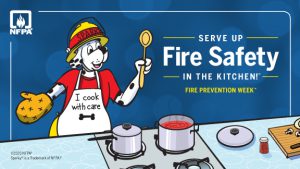Fire Prevention Week
Fire Prevention Week is October 4th -10th 2020. Every year, Fire Prevention Week (FPW) is recognized to educate the public about important fire safety matters. FPW has been sponsored by the NFPA since 1922 in commemoration of the Great Chicago Fire of 1871. The Great Chicago Fire killed more than 250 people, left 100,000 homeless, destroyed more than 17,400 structures, and burned more than 2,000 acres of land. By educating those around us about fire safety and prevention measures, we can prevent tragic fire accidents.
“Serve Up Fire Safety in the Kitchen!”
This year, the theme for Fire Prevention Week is “Serve Up Fire Safety in the Kitchen!” Since cooking is the leading cause of home fires and home fire injuries, it is important to know some important actions that you can take to stay safe in the kitchen. Unattended cooking is the leading cause of fires in the kitchen.
Don’t Leave Your Cooking Unattended
When you are frying, boiling, grilling, or broiling food, always stay in the kitchen. Even if you leave the kitchen for a short period of time, turn off the burner. It’s important to regularly check up on your food when you are simmering, backing, or roasting food. Always use a timer to remind yourself that you are cooking and don’t cook when you have been consuming alcohol or are feeling drowsy.
Clear Your Cooking Area
You should try to keep anything that can catch fire including oven mitts, wooden utensils, and towels away from the stovetop. Setting kid-free zone of 3 feet around the stove can prevent injuries or fire accidents. Always clean up food and grease from your stovetop.
Prevent Kitchen Fires from Getting Out of Control
While cooking, you should always keep a lid nearby. If a small grease fire starts, you should cover the pan and turn off the burner. You should not discharge a portable fire extinguisher into a grease fire. If you have a fire in your oven or microwave, you should keep the door closed and shut off the appliance.
Prevent Burns and Scalds
Some ways to prevent burns and scalds include turning pot handles away from the stove’s edge and keep hot food and liquids away from the table and counter edges. You should keep your appliance cords coiled and away from counter edges. Always keep your face away from the oven door when checking or removing food so heat or steam does not cause burns.
If you are interested in learning more about Fire Prevention Week and how you can participate, visit the NFPA’s website.
